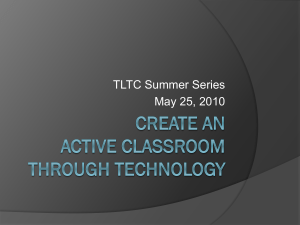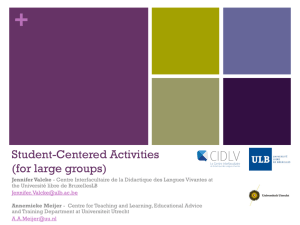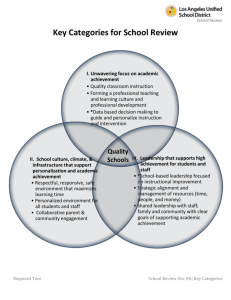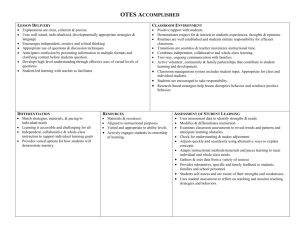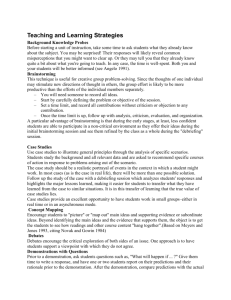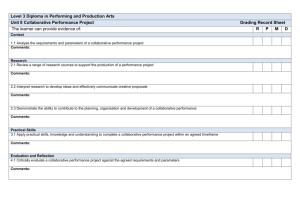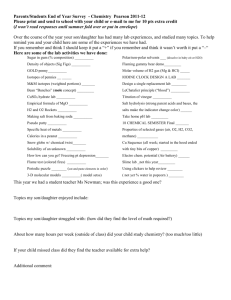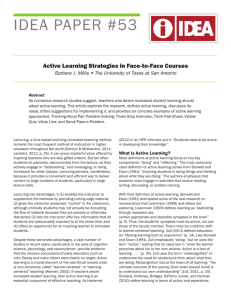active learning
advertisement
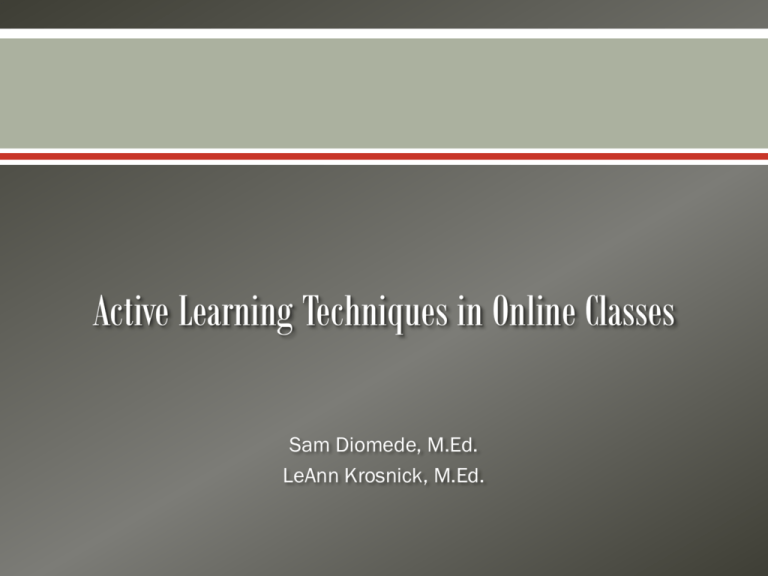
Active Learning Techniques in Online Classes Sam Diomede, M.Ed. LeAnn Krosnick, M.Ed. Relate active learning to Bloom's Taxonomy Describe various active learning instructional strategies for online learning Identify technology that supports active learning techniques What is active learning? Reflect on your practice Examples in online courses "The student actively participates in the learning process and takes responsibility for their learning. (Machemer & Crawford, 2007)" Bonwell and Eison describe Active Learning strategies as those that involve "students doing things and thinking about the things they are doing (Bonwell and Eison, 1991)." Invites students to IDENTIFY, EVALUATE, or APPLY ideas contained in new sources Focuses on CONSTRUCTING, SHARING, and REFINING knowledge Designed for COLLABORATIVE, INTERDEPENDENT learning: PEER INPUT key to learning Includes MULTIPLE ITERATIONS for practice: REFLECTION and FEEDBACK are integral part May be SEVERAL possible CORRECT ANSWERS/SOLUTIONS Potential for HIGHLY CREATIVE CONTRIBUTIONS (Salmon, 2013) Reflect on your own teaching practice: What is one instructional strategy that you have found to be highly effective in helping students meet learning objective(s)? Why was this strategy effective? Did your teaching strategy… Invite students to IDENTIFY, EVALUATE or APPLY ideas contained in new sources? Focus on students CONSTRUCTING, SHARING and REFINING knowledge Have students working in COLLABORATIVE, INTERDEPENDENT groups, was PEER INPUT key to learning Include MULTIPLE ITERATIONS for practice and include REFLECTION and FEEDBACK. Have SEVERAL possible CORRECT ANSWERS/SOLUTIONS Have the potential for HIGHLY CREATIVE CONTRIBUTIONS (Salmon, 2013) Categories of Active Learning Online 1. Individual learning activities are types where the learner applies course content that is read either online or through course materials through writing and other projects. 2. Cooperative learning can be defined as a structured form of group work where students pursue common goals while being assessed individually. (Discussions, Blogs) 3. Collaborative learning refers to any instructional method in which students work together in small groups toward a common goal. (Wikis, Group Work) Promote active learning using online discussions … Online Discussion Use Case Study/Scenario Case studies are an ideal way to illuminate the practical consequences of different concepts and discuss opposing viewpoints with classmates. Example from medical ethics course A 72-year-old man is admitted to the hospital for a kidney transplant. His daughter is brought in as the best available match as a donor. As the man’s doctor, you discover from the pre-op lab work that the daughter is not a suitable donor because she is not his biological daughter. What, if anything, do you tell the man, his wife, or the daughter? Online Discussion Promote Controversy Select a recent ‘hot’ news topic, prompt students to take one ‘side’, explain his or her position, and then respond to a classmate with an opposing viewpoint. Example from information security course A fundamental tenet of information security is that you must force the user to periodically change his or her password. But this practice actually undermines security. With constantly changing passwords, users are forced to write them down in an easy-to-find location or use an easy-to-guess algorithm (my street address followed by a ‘1,’ then changed to a ‘2,’ then changed to a ‘3,’ etc.). We are better off letting users keep the same password indefinitely. Do you agree? Online Discussion Use Student Moderators to Facilitate Discussion • Facilitator/Encourager: This student gets discussion moving and keeps it moving, often by asking the other group members questions, sometimes about what they've just been saying. • Timekeeper: This student makes sure that the class stays on track within the given time period. • Summarizer: This student provides a summary of the discussion for other students to approve or amend. • Reflector: This student will listen to what others say and explain it back in his or her own words, asking the original speaker if the interpretation is correct. • Elaborator: This person seeks connections between the current discussion and past topics or overall course themes. Promote active learning using online journals … Online Journals can be used for… • Observations: Students write about what they actually saw or their viewpoint on a particular event. • Speculations: Students write a conclusion/opinion after contemplation • Self-awareness: Students place themselves in a situation by considering the ramifications. • Critique: students self-reflect on or “critique” a situation Promote active learning using online groups… “In a traditional physics course, two months after taking the final exam, students are back to where they were before taking the course,” Mazur notes. ‘It’s shocking.’ Peer-instructed students who’ve actively argued for and explained their understanding of scientific concepts hold onto their knowledge longer.” Eric Mazur, Harvard Physics Professor Online Groups I Strategies for effective group work… • At beginning of semester, all students introduce themselves in discussion forum • Ask students to add a photo to their Blackboard profile. • Announce group work at beginning of semester • Limit group size to 3 – 4 students • Include a peer review and make students aware upfront Online Groups II Strategies for effective group work… • Build in a small-scale group assignment as a starter activity • Include a purpose and detailed & specific instructions for each group assignment • Encourage teams to explore the use of collaborative tools such as Google Docs, Dropbox, Skype • Have group members evaluate contribution of each individual (make them aware of this up-front) Promote active learning using wikis… • Blackboard feature for online writing collaboration • Saves each iteration of an edit so you can revert back if you need. • Logs who made edits and when. • This is good tool for a group writing project, where it is east for students to build and strengthen previous entries. Bonwell, C.C. & Eison, J.A. (1991). Active learning; Creating excitement in the classroom. ERIC Digest. Salmon, G. (2013). E-tivities: The key to active online learning. New York, NY.
